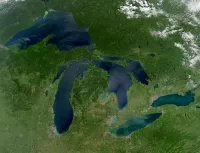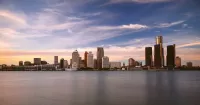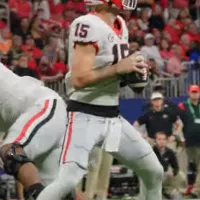The Detroit Water and Sewerage Department (DWSD) is a public utility providing water and sewerage services. Previously serving Detroit and 126 other communities, in 2016, following Detroit's bankruptcy, the DWSD's operations changed significantly. The Great Lakes Water Authority (GLWA) was formed, leasing DWSD assets for $50 million annually over 40 years. DWSD refocused exclusively on serving water and sewer customers within Detroit.
1992: Water Quality Concerns in 1992
A 1992 survey revealed that several water providers receiving Detroit Water and Sewerage Department (DWSD) water reported significant amounts of unlined cast-iron pipe, leading to customer complaints about red/rusty water due to iron uptake.
2000: DWSD Water Provision in 2000
In 2000, the Detroit Water and Sewerage Department (DWSD) supplied water to approximately four million customers in Detroit and its metropolitan area using five water treatment plants fed from the Detroit River and Lake Huron.
June 10, 2013: Protests Begin at Homrich Wrecking Inc.
On June 10, 2013, protests against water shutoffs began at Homrich Wrecking Inc., resulting in forceful removal of protestors by police.
June 2014: DWSD Debt and Privatization
As of June 2014, the Detroit Water and Sewerage Department (DWSD) was facing significant debt and delinquent accounts, leading to discussions about potential privatization efforts described as aiming "to get rid of the bad debt associated with the water department and prep the public entity for privatization".
June 2014: Democracy Now Article
In June 2014, a Democracy Now article covered the Detroit water crisis.
July 21, 2014: City of Detroit Delays Water Shut-Offs
On July 21, 2014, the City of Detroit announced delays in further water shut-offs in response to public protests regarding shutoffs.
July 29, 2014: Emergency Manager Transfers Power
On July 29, 2014, Detroit's Emergency Manager Kevyn Orr transferred control over the Detroit Water and Sewerage Department (DWSD) to Mayor Mike Duggan, who pledged changes but supported the policy of water shutoffs for unpaid bills.
July 30, 2014: Legal Proceeding Filed
On July 30, 2014, a legal proceeding was filed by two citizens seeking $4,400 in damages after their water was shut off by the city.
August 2, 2014: Water Affordability Fair
On August 2, 2014, the Detroit Water and Sewerage Department (DWSD) hosted a Water Affordability Fair to address concerns about water shutoffs and market financial assistance programs for struggling customers.
August 7, 2014: Duggan's Ten-Point Plan
On August 7, 2014, Mayor Duggan announced a ten-point plan to address water bill collection and restore water service to some residents.
August 25, 2014: Resumption of Water Shutoffs
On August 25, 2014, the Detroit Water and Sewerage Department (DWSD) announced the end of a temporary halt to new shutoffs, resuming water shutoffs.
2014: Ongoing Water Shutoffs
Between 2014 and 2020, over 50,000 additional water shutoffs occurred in Detroit, indicating an ongoing conflict without a definitive resolution.
2014: DWSD Debt and Privatization Talks in 2014
In mid-2014, the Detroit Water and Sewerage Department (DWSD) was facing significant debt and delinquent accounts, leading to discussions about potential privatization.
2014: Detroit Water Crisis and Shutoffs in 2014
Starting in 2014, during Detroit's bankruptcy, the Detroit Water and Sewerage Department (DWSD) began shutting off water to residents with missed payments. In April 2014, the DWSD reported a $118 million debt due to unpaid water bills, leading to the shutdown of water access for over 150,000 residents, initially affecting 20,000 homes.
2014: Environmental Injustice
The 2014 Detroit Water Shutoffs are considered a form of environmental injustice, disproportionately affecting marginalized communities economically and racially.
January 1, 2016: Great Lakes Water Authority Creation
On January 1, 2016, the Great Lakes Water Authority (GLWA) was created under the terms of Detroit's municipal bankruptcy, involving a $50 million annual lease agreement with the City of Detroit for 40 years. The Detroit Water and Sewerage Department (DWSD) refocused its services specifically within the city of Detroit.
March 9, 2020: COVID-19 Water Restart Plan
On March 9, 2020, the City of Detroit implemented a COVID-19 Water Restart Plan to ensure water access during the pandemic, offering a reduced monthly rate of $25 for eligible residents until December 31, 2020.
2020: Ongoing Water Shutoffs
Between 2014 and 2020, over 50,000 additional water shutoffs occurred in Detroit, indicating an ongoing conflict without a definitive resolution.
December 31, 2020: COVID-19 Water Restart Plan End Date
The City of Detroit's COVID-19 Water Restart Plan, instituted on March 9, 2020, to keep water flowing during the pandemic, was in effect until December 31, 2020.
2025: DWSD Service in 2025
As of 2025, the Detroit Water and Sewerage Department (DWSD) serves over 230,000 accounts, which includes roughly 175,000 households and 30,000 businesses or nonprofits, and the water distribution system includes over 2,700 miles of water mains and around 29,000 fire hydrants.
Mentioned in this timeline

The Great Lakes are a chain of five large interconnected...

Detroit Michigan's most populous city sits on the Detroit River...

Fire is a rapid oxidation process called combustion releasing heat...
Blue is a primary color in both the RGB and...
Red is a color at the long wavelength end of...
The letter S in both uppercase and lowercase forms is...
Trending

1 month ago Chet Holmgren's Champion Comeback: Avoiding Hangover, Praised by Shai Gilgeous-Alexander, Potential Comparisons
Luke Kornet is an American professional basketball player currently playing for the San Antonio Spurs in the NBA He's a...

Iris Apatow is an American actress known for her roles in Netflix productions She played Arya Hopkins in the Netflix...

1 month ago Bam Adebayo Unhappy with Anthony Davis Trade Rumors, NBA Volatility Impacting Players

2 months ago Guy Fieri Hospitalized After Gruesome On-Set Leg Injury Requiring Emergency Surgery

8 months ago Sheinelle Jones' Husband, Uche Ojeh, Passes Away at 45 After Cancer Battle
Popular

Carson Beck is an American college football quarterback currently playing...
Curt Cignetti is an American college football coach currently the...

XXXTentacion born Jahseh Dwayne Ricardo Onfroy was a controversial yet...
WWE Raw a professional wrestling television program by WWE airs...

Stranger Things created by the Duffer Brothers is a popular...

Kristi Noem is an American politician who has served as...